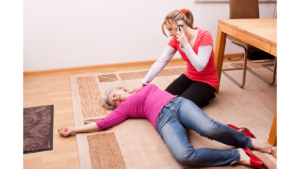Fainting is a form of sudden unconsciousness that happens due to a lack of blood going to the brain. It is usually brief and may or may not have greater medical significance.
This article explains the symptoms and possible reasons why a person loses consciousness. It also details treatment and prevention options for fainting.
Background

Most fainting victims recover quickly, with no ongoing medical consequences. An episode typically lasts a few seconds, although it may have after-effects such as dizziness, nausea, fatigue, and in some cases, vomiting. Recovery may take several minutes. If the person does not recover quickly, always seek immediate medical attention.
Syncope is extremely common, and it can happen at any age. It may start during childhood, although episodes occur more frequently in young adults and adults. 1 in 4 children will experience fainting at some point. By the age of 40, half of the population will faint at least once.
People with a history of fainting are at considerable risk of fall injuries. One-third of these people suffer from minor cuts and bruising afterwards. Bone fractures and dislocations may also occur.
It is vital to see a healthcare professional help determine its cause and rule out the possibility of health conditions.
Common Cause of Fainting
Dehydration
Too little water flowing in the bloodstream can lead to a sudden drop in blood pressure.
Dehydration factors include diarrhoea, vomiting, heat stress, and burns. All these can stimulate the vagus nerve, which can trigger fainting symptoms.
Shock
Not all faint episode relates to the vagus nerve.
Shock is a critical condition characterized by low blood pressure. It may be because of trauma, blood loss, allergic reaction (anaphylaxis), burns, and other causes.
A person in shock does not get enough blood or oxygen to the body, leading to a loss of consciousness.
Uncontrolled Diabetes
A person with diabetes is prone to frequent urination, leading to dehydration. High blood sugar levels can cause damage to the nerves, especially those responsible for regulating blood pressure.
Medications
Certain medications such as diuretics, beta-blockers, and antihypertensive drugs can cause low blood pressure in some people.
Alcohol
Alcohol has a diuretic effect, which can make people urinate. Frequent urination will eventually lead to dehydration.
Alcohol also dilates the blood vessels, which decreases blood pressure. Passing out is also a sign of severe intoxication.
Neurological conditions
Parkinson’s disease and other neurological conditions can negatively affect the nervous system. These may lead to orthostatic hypotension or a form of low blood pressure.
Carotid Sinus Syndrome
Carotid sinus hypersensitivity is a response to pressure within the carotid artery – the main artery that supplies blood to the brain. It can result in syncope and can potentially be fatal.
Other less common causes of fainting are anxiety, panic disorder, stress, and loss of consciousness at the sight of blood.
First Aid for Fainting
Fainting can be intimidating for people who don’t have proper first aid training. Before anything else, check if the person is still breathing.
Put the person into the recovery position to maintain a clear airway and decrease the risk of choking. Follow the first aid steps below.
- Tilt the person’s head backwards, with the chin slightly lifted.
- Check the airway for any signs of obstructions.
- If the person is not breathing, immediately call triple zero (000) – or have someone else do it – and begin CPR.
- Monitor their condition and stay with them until they recover, or medical help (such as an ambulance) arrives to take over.
- If the person suffers from a fall injury, make sure to treat cuts, bruises, and bumps properly.
- Control any external bleeding by applying direct pressure.
The outcome mainly depends on the causes of fainting. However, the sooner the person receives first aid treatment, the better the outlook will be.
Get First Aid and CPR Training Today
Fainting can be a common occurrence. But it is concerning to see a person collapse and lose consciousness without warning.
It is best to consult a doctor to check if it is a simple faint or something heart related, and potentially life threatening.
Learn the proper First Aid Treatment for fainting to become more confident and step up when these incidents happen. Book a first aid course today.
